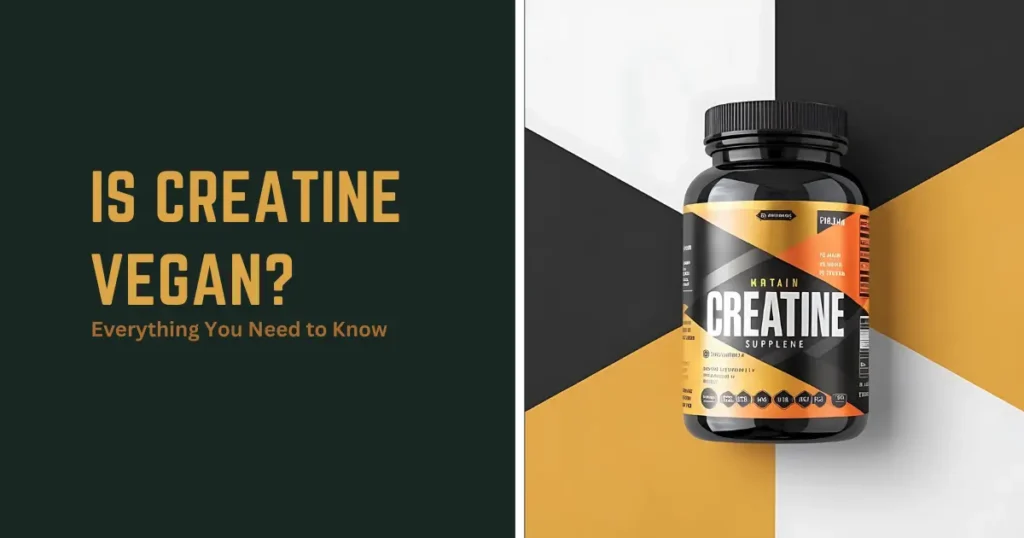Creatine is one of the most popular supplements used by athletes and bodybuilders to enhance performance and muscle growth. But is creatine vegan? Yes, most creatine supplements are vegan because they are synthetically produced. This article will delve into the production process, and vegan-friendly options, and debunk common myths about creatine.
What is Creatine?
Creatine is a compound naturally found in muscle cells. It helps produce energy during high-intensity activities like weightlifting or sprinting. In omnivorous diets, creatine comes from animal products such as meat and fish. Since vegans don’t consume these sources, creatine supplementation becomes crucial to maintain optimal muscle creatine levels.
Is Creatine Vegan?
The good news is that most creatine supplements are vegan. Creatine monohydrate, the most common form, is typically produced through chemical synthesis from compounds like sarcosine and cyanamide, with no animal products involved in the process. However, vegans should watch out for creatine capsules, as these sometimes contain gelatin, which is derived from animals.
Key Ingredients in Creatine Supplements and Their Functions
Creatine supplements are typically composed of the following ingredients:
- Creatine Monohydrate: The most common form, synthesized from compounds like sarcosine and cyanamide. It combines creatine with water molecules for effective energy production.
- Micronized Creatine: A more refined version of creatine monohydrate with smaller particles, allowing for quicker absorption and easier mixing in liquids.
- Creatine Hydrochloride (HCL): Known for its higher solubility, this form minimizes gastrointestinal issues and is easier on the stomach.
- Gelatin (in capsules): Commonly used in capsule form, but non-vegan. Vegan options use plant-based alternatives like cellulose.
- Anti-Caking Agents: These ingredients, such as silicon dioxide or magnesium stearate, help maintain the texture and prevent clumping.
- Flavorings and Sweeteners (optional): Added for taste in flavored creatine powders, using either natural or artificial options like sucralose.
- Other Additives: Some supplements may also include additional ingredients like electrolytes or amino acids (e.g., taurine) to enhance recovery.
To ensure your creatine supplement is vegan, always check for the absence of animal-derived additives like gelatin.
Different Types of Creatine Supplements
There are several types of creatine supplements available for vegans, each with unique benefits:
- Creatine Monohydrate: The most extensively studied and commonly utilized form. It is highly effective for increasing muscle mass and strength.
- Creatine Hydrochloride: Known for its higher absorbability, some athletes prefer it for its reduced risk of stomach discomfort.
- Micronized Creatine: This type has been processed into smaller particles, making it easier to dissolve and absorb.
Top-rated vegan-friendly creatine brands include Jacked Factory Creatine and Naked Creatine, both offering pure, non-GMO, vegan-friendly creatine.
Why Should Vegans Consider Creatine Supplementation?
Vegans generally have lower muscle creatine levels since plant-based diets don’t provide creatine. Supplementation can help increase muscle mass, improve recovery, and boost performance in high-intensity activities. Vegan athletes, in particular, may find creatine beneficial for enhancing their workout capacity and achieving better muscle gains.
Health and Safety Considerations
Creatine is generally considered safe, but users may experience side effects like water retention. Proper hydration is essential when taking creatine. Moreover, it’s crucial to dispel the myth that creatine is harmful to your kidneys—research shows it is safe for long-term use. However, it’s wise to consult a healthcare provider, especially for those with pre-existing conditions.
How to Choose the Right Vegan Creatine Supplement
When selecting a Creatine supplement, always check the labels for gelatin-free options. Opt for creatine powders over capsules if you want to avoid any risk of animal-derived ingredients. Look for third-party certifications like NSF or Informed Choice, which ensure the product’s safety and vegan-friendly status.
Myths About Creatine
- Myth 1: Vegan creatine is less effective. In reality, the source of creatine doesn’t affect its potency. The efficacy depends on the purity of the product.
- Myth 2: All creatine supplements are vegan. While the creatine itself may be vegan, capsules may contain gelatin. Always check the ingredients.
- Myth 3: Creatine is only for bodybuilders. Creatine benefits anyone involved in high-intensity sports, from runners to cyclists.
Most creatine supplements are vegan, making them a great option for those following plant-based diets. Vegans should carefully select their supplements by choosing gelatin-free options and verifying third-party certifications. By incorporating vegan-friendly creatine, athletes can improve their performance, recovery, and muscle mass.




